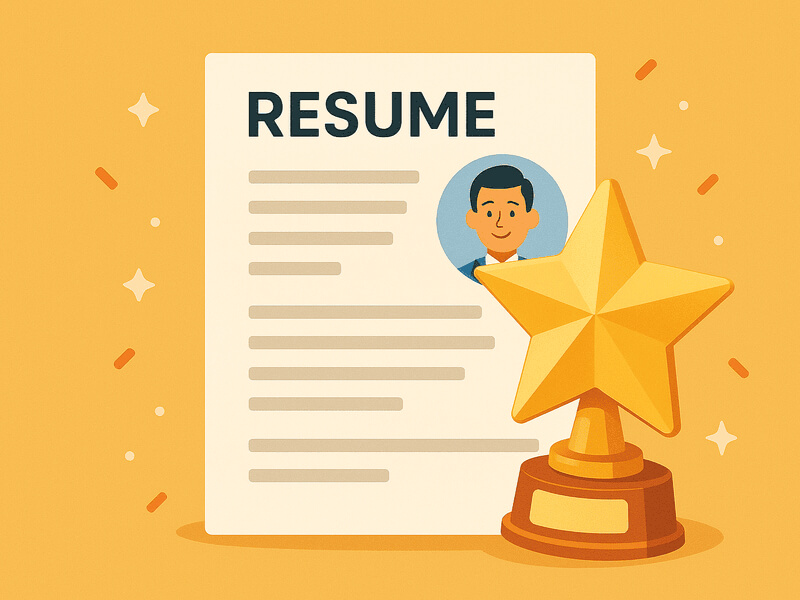
Resumes do more than record jobs and skills. They act as marketing tools that sell your value. Awards and recognition prove achievement, making your profile stronger. Employers notice concrete results, not vague claims. A resume that presents honors clearly feels persuasive. Done right, recognition turns a plain list into a career story worth remembering and trusting.
Why Awards Matter on a Resume
Every recruiter scans resumes quickly. They look for details that separate one candidate from the rest. Awards highlight success in measurable ways. They provide proof of dedication, effort, and results. When you include them, you show evidence of your work ethic. You also demonstrate that peers or institutions recognized your contributions. Whether in school, work, or community, these distinctions display both skill and commitment. A strong awards and recognition resume communicates reliability and excellence.
How to Highlight Awards on Resume
Presentation is key. Awards must look professional, not like casual mentions. Write the award’s name, who granted it, and the date. Briefly note why you received it. Clarity keeps recruiters engaged. Many job seekers rely on professional resume writers online for deeper guidance. They know exactly how to highlight awards on resume with phrasing that attracts attention without sounding exaggerated. Experts refine wording, ensure proper placement, and make every achievement shine. An outside perspective can also help identify which awards are relevant and how to balance them with experience.
Types of Awards to Put on Resume
Not all achievements hold the same weight. Some are professional, others academic, and a few may even come from extracurricular activities. Choosing the right ones ensures relevance. Here are categories worth considering:
- Academic honors. Dean’s list, scholarships, research prizes.
- Professional recognition. Employee of the month, sales contests, project awards.
- Industry awards. Certifications with honors, best-in-class titles, conference recognitions.
- Community or volunteer awards. Service excellence, leadership medals.
- Creative or technical contests. Design competitions, hackathons, innovation prizes.
Choose awards that match the role you seek. Relevant honors strengthen your case. Old or unrelated achievements add clutter, weaken impact, and risk distracting recruiters from real value.
Where to Place Awards on Resume
The layout depends on how many recognitions you have. A candidate with several honors should create a dedicated honors and awards section resume. This structure highlights them in one place, easy for recruiters to see. If you only have one or two distinctions, you can weave them into experience or education. For example, under a job entry, mention that you received "Top Sales Performer Award 2023." This makes it natural and specific. Strategic placement matters. Following a comprehensive resume writing guide ensures your awards receive the attention they deserve from hiring managers. Awards should not be hidden at the bottom where they risk being overlooked. For more in-depth tips on effectively showcasing your awards and achievements in resume, refer to this expert guide.
Writing Awards in Bullet Points
Clarity often works best through lists. Bullet points make achievements sharp, direct, and easy to read. For instance:
- Winner, National Marketing Innovation Award (2022) – Led digital campaign that boosted reach by 40%.
- Employee of the Year, TechSolutions Ltd. (2023) – Recognized for leadership in product development.
- Dean’s Scholarship, University of Chicago (2019–2021) – Earned for consistent academic excellence.
This method delivers impact fast. Each line proves success. Recruiters value concise, result-focused entries.
Awards vs. Certifications
Some candidates confuse certifications with awards. Both belong on resumes, but they differ. Certifications prove technical knowledge through exams or training. Awards, on the other hand, recognize performance or achievement. If you earned a certificate with distinction, mention it under awards. Otherwise, place it in a separate section. Mixing them together may cause confusion. Clear distinctions display professionalism and organizational skill.
Adding Awards on Resume Professionally
Avoid clutter. Too many details overwhelm readers. When adding awards on resume professionally, balance them with skills and experience. Select those that reinforce your career goals. For instance, an IT manager applying for leadership roles should highlight technical excellence and team awards. A graphic designer should focus on design competitions or creative honors. Tailoring makes the document focused.
Common Mistakes to Avoid
Some errors weaken the impact of recognition. Be aware of these pitfalls:
- Overloading the resume – Filling the page with minor prizes reduces focus. Select only honors that prove value.
- Lack of details – Writing “Award Winner” without context tells nothing. State who granted it and why it mattered.
- Outdated achievements – A school medal from years ago adds little weight. Highlight recent and relevant honors instead.
- Irrelevant honors – Include achievements that strengthen your case. Leave out items unrelated to your career path.
Professional recognition on resume must connect directly to the role you pursue.
Examples of Placement
Here are three ways to format recognitions:
1. Separate Section Example:
Honors and Awards - Sales Leader of the Quarter, Q2 2024. Community Leadership Award, City Council, 2023.
2. Under Job Experience:
ABC Company, Project Manager - Directed a team of 10. Awarded "Innovation Leader" for launching new workflow system.
3. Education Section:
University of Boston - Graduated with Honors, Dean’s List, 2018–2020
These layouts show flexibility depending on career stage.
Why Awards Strengthen Your Brand
Employers want more than skills. They want proof that a candidate excels in real scenarios. Awards do this. They create trust. They show that others already valued your work. An honors and awards section resume adds credibility. It helps you stand out in competitive industries. For graduates, it fills space with meaningful content. For professionals, it highlights long-term growth.
Awards and Recognition in Digital Resumes
Today, resumes often go through applicant tracking systems (ATS). Keywords play a major role in passing filters. Adding precise award titles increases your chance of being noticed. For example, including "Best Sales Performance 2022" may trigger recognition in a sales-related job search. Detailed achievements can boost ATS visibility. Digital resumes also allow for links. If you have an online portfolio or media mention about your award, hyperlink it. Just ensure links look clean and professional.
Crafting Balance: Awards with Skills
Awards alone don’t win jobs. They must complement skills and experiences. Balance your resume by blending recognitions with measurable contributions. For instance:
- Increased department efficiency by 20%. Recognized with “Employee Impact Award.”
- Designed user interface for app with 50,000 downloads. Won “UX Design Challenge.”
This integration strengthens the story. Achievements appear as part of your career path, not as separate decorations.
Final Tips Before Submitting
A few final steps can refine your resume and ensure awards make the right impression.
- Always proofread for accuracy. Check names, dates, and award titles. Correct grammar and spelling.
- Keep formatting consistent. Use clear headings and equal spacing. Apply the same style across all sections.
- Use strong verbs to describe achievements. Choose precise words that highlight results. Add numbers or outcomes when possible.
- Update the list as your career progresses. Include new honors. Remove outdated details. Keep the section relevant.
Recruiters respect organized, updated resumes written by the best resume writers or career coaches, which you can easily find in Los Angeles. Adding awards on resume professionally signals precision and credibility.
Conclusion
Awards prove success in a way words alone cannot. They show credibility, ability to achieve goals, highlight talent, and make you stand out. Place them wisely, either in their own section or inside job entries, to give your resume impact. A clear honors and awards section resume reflects professionalism and confidence. Choose achievements with relevance, explain their value, and present them with precision to transform your resume into a strong career asset.
























